
It is made up of works originating from dissertations from the Masters in Constitutional Law at IDP, which stood out for their rich content and the relevance of the themes analyzed.
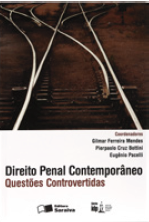
Author: Gilmar Ferreira Mendes, Pierpaolo Cruz Bottini and Eugênio Pacelli
Synopsis: Result of the partnership between Editora Saraiva and the Instituto Brasiliense de Direito Público, the IDP Series offers academics reference works that facilitate the understanding of elementary legal concepts and institutes, philosophical questions and themes that guide current legal literature. The volume Contemporary Criminal Law, coordinated by GIlmar Mendes, Minister of the Federal Supreme Court, Pierpaolo Cruz Bottini, lawyer, and Eugênio Pacelli, Regional Attorney of the Republic in the Federal District, deals with exciting topics of undeniable theoretical and practical interest. If the reader assumes that the careful scientific analysis of the texts is restricted to an obscure or hermetic approach, they will be surprised. In this work the approach is clear and objective, and the reading is pleasant and easy to understand. As for the content, Günter Jakobs was responsible for examining “The Dilemmas of Criminal Law”; to Renato de Mello Jorge Silveira, the topic “Social adequacy and Criminal Law”; to Eugênio Pacelli, “Functionalism and penal dogmatics: essay for a system of interpretation”; to Pierpaolo Cruz Bottini, “The paradox of risk and contemporary criminal policy”; to André Luís Callegari, “Possible intent and traffic crime”; to Ana Elisa Liberatore S. Bechara, “Human rights and criminal law: limits of rational criminal intervention in the democratic rule of law”; to Cláudio Brandão, “Culpability in penal dogmatics”; to Fabiano Augusto Martins Silveira, “The review of the constitutionalist model of criminal offenses and the so-called 'consequence guidance'”; to Mariângela Gama de Magalhães Gomes, “Dangerousness in contemporary Criminal Law”; and Mohamad Ale Hasan Mahmoud, “Criminal liability: controversial aspects”. This book represents a milestone in the philosophical studies of Criminal Law. As it deals with the most controversial and thought-provoking aspects, it will certainly encourage consultation from professionals and academics.
Buy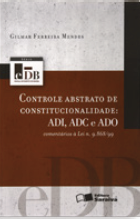
Author: Gilmar Ferreira Mendes
Synopsis: This work fills an important gap in the publishing market, exposing, with doctrinal and practical comments, about the direct action of unconstitutionality, the direct action of unconstitutionality by omission and the declaratory action of constitutionality. The author condenses the most relevant issues in national and foreign jurisprudence on fundamental rights.
In fact, the importance of the topic in the STF is indisputable. Related topics, such as the right to health, freedom of the press in a democratic State, control of constitutionality, acquired rights and legal security are some of the topics covered in this work.
Buy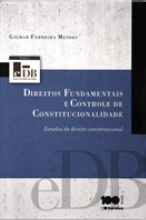
Author: José Levi Mello do Amaral Júnior
Synopsis: This work's main purpose is to condense the most relevant issues arising in national and foreign jurisprudence on fundamental rights. The importance of the dogmatics of fundamental rights and their notable presence in the jurisprudence of the Federal Supreme Court are indisputable, which is why this 4th edition, reformulated, gives them different treatment.
In this sense, it is worth highlighting the inclusion of chapters on the right to health (Chapter 6) and the meaning of freedom of the press in a democratic State (Chapter 9). These studies seek to organize and analytically expose the jurisprudence of the Federal Supreme Court developed based on these themes.
It is also important to highlight that extensive modifications and updates were made here on acquired rights, perfect legal acts and res judicata (Chapter 4) and on the study of fundamental rights of a procedural nature (Chapter 5).
In the chapter on political rights in the 1988 Constitution, in addition to other changes, it is worth highlighting the detailed analysis of the compromises that involved the application of the so-called Clean Record Law to the 2010 elections.
For all these reasons, the changes implemented in this edition seem to indicate that the work will remain.
Buy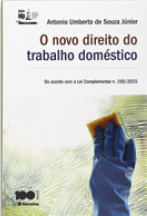
Author: Antonio Umberto de Souza Júnior
Synopsis: This book recovers the history of domestic work and examines, one by one, all the traditional rights and all the new benefits that Brazilian laws recognized for the category of residential employees, with support in court jurisprudence and doctrine and without ceasing to assist in practice, with the suggestion of a complete form of a domestic employment contract, and reproduction of the rules that govern this very important type of employment relationship.
Buy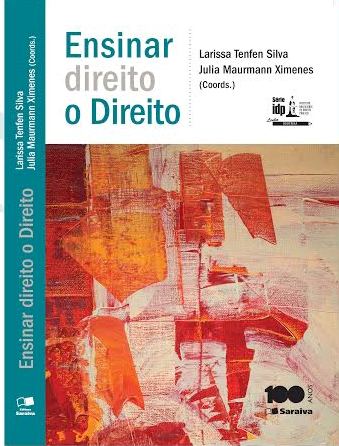
Author: Julia Maurmann Ximenes and Larissa Tefen Silva
Synopsis: According to the 2013 Higher Education Census, published by INEP/MEC, Brazil has 769,889 students enrolled in Law courses, equivalent to 10.23% of the total number of students enrolled in higher education in Brazil.
These data anticipate the relevance of the analysis of what the Law course is today – graduate profile, content taught in the classroom, role of the Law operator and the impact of the number of graduates on the relationship between Law and society.
However, the numbers also demonstrate the impact on complex controversies in the legal field. There is a lot of discussion about the teaching of Law in Brazil. What is the best strategy to achieve commitment from these 769,889 students who choose the course? How to find the connection between reflective knowledge and the demands of the market and public competitions, so desired by these same students? How to reconcile theory and practice? What is the profile of the graduate expected in an increasingly “judicialized” society? How is academic research in the legal field doing in the face of these same tensions?
These are some of the main concerns of the group of teachers in this work. For them, the challenge involves new teaching techniques, which go beyond “banking” teaching, with proposals that include skills and abilities, group discussion, problematization, self-composing techniques, the “formative” character of Law in promoting citizenship , integration with technology, the role of open standards, in addition to the discussion on research in Law.
Therefore, the proposal of the work is to reflect on the teaching of Law from a critical perspective, introducing possibilities for teaching closer to the reality experienced by the student and the future practitioner of Law.
Buy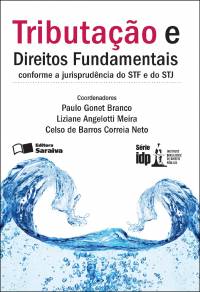
Author: Paulo Gonet Branco, Celso de Barros Correia Neto, Liziane Angelotti Meira
Synopsis: This volume is the result of discussions promoted by the institution's select group of scholars, who are dedicated to examining the relationship between fundamental rights and tax law in the decisions of the Federal Supreme Court and the Superior Court of Justice.
Two perspectives are adopted: the way in which fundamental rights can interfere in the application of tax legislation, especially to limit it, and the way in which tax law, with greater or lesser success, meets the enforcement of these same rights.
In the first case, the affirmation of fundamental rights against taxes is contextualized, such as limits, blocks or restrictions. In the second, taxes or, more precisely, tax rules, taken in a broad sense, are the ideal means to implement the fundamental rights enshrined in the constitutional text.
The coordinators systematized the work into three parts: the first records the objectives and introduces the study theme; the second comprises the interrelationships between taxes and human rights, in their different perspectives; and the third part brings together cases from jurisprudence, without limiting itself to recording the winning guidance or current trends of the courts.
Remember that case studies allow us to examine and problematize the theses adopted in the rulings in light of the legal and social context in which they are inserted, through the legal foundations of the decision, the rejected arguments, as well as the close or remote implications of the decisions. .
At a time when tax postulates are frequently discussed, considering that the links between economic development and the discipline are inseparable, it can be safely said that this launch occurs at an opportune moment.
Buy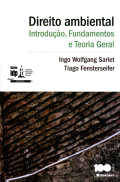
Author: Ingo Wolfgang Sarlet, Tiago Fensterseifer
Synopsis: Environmental Law was born, as a branch of Law, in the 1970s, especially as a reaction to environmental degradation practices, which had been marking the evolutionary trajectory of human civilization. Environmental degradation has come to be seen as an affront to the elementary values of our society, as well as, consequently, of our legal system, even more so when its scope is to guarantee, protect and promote human dignity and human and fundamental rights, without prejudice to the dignity of non-human life and the autonomy of ecological legal good. It is precisely the non-conformity with such a “state of affairs”, that is, with the disrespect for life and Nature, that makes Environmental Law, returning to its sociological and philosophical-ethical roots, an instrument of struggle and affirmation of life in its dimension as wide as possible. This is the fundamental reason that we hope will be the Leitmotif for the study of Environmental Law.
Buy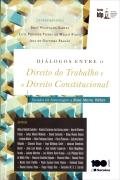
Author: Ingo Wolfgang Sarlet, Luiz Philippe Vieira de Mello, Ana de Oliveira Frazão
Synopsis: The right to work is not just one among many fundamental rights, enshrined in the Federal Constitution of 1988, but, in addition – in synergy, and on an equal footing with the dignity of the human person –, it represents a value and fundamental principle of order Brazilian legal-constitutional. Even though worker protection in various senses has already been an object of consideration in past national constitutionalism, it is undeniable that, under the aegis of the current Constitution, it has reached practically unprecedented and unparalleled levels even in the broader context of comparative constitutional law and international system for the protection of human rights.
The gains were not, it is important to emphasize, only quantitative, that is, from the perspective of the number of rights attributed to workers, but also in qualitative terms there were significant advances, starting with the fact that the right to work and workers' rights took over, for the first time in the Brazilian constitutional trajectory, the condition of true fundamental rights, endowed with a reinforced legal regime equivalent to that of other fundamental rights, namely civil and political rights.
Buy
Author: Paulo Roberto Barbosa Ramos
Synopsis: A few decades ago, old age was considered a private matter, that is, it only concerned families that had people in this age group among their members. It turns out that the association of several phenomena, such as the intensification of the urbanization process, the advancement of medical technology, the universalization of the notion of hygiene, not to mention the expansion of basic sanitation, contributed decisively to the change in the age profile of the population, because it facilitated the accelerated aging process.
With improved sanitary conditions and medical technologies, people stopped dying prematurely, adding more years to their lives. No longer a reality only for a small number of individuals, who enjoyed conditions that subjected them to fewer risk factors for death, a significant contingent of human beings now had the opportunity to grow old, enabling the emergence of a new and significant rights-holding social segment.
In this way, old age ceased to be a merely private issue and became a relevant social issue, demanding the attention of the State for the development of specific public policies that serve subjects with rights belonging to a new phase of existence, hitherto invisible. This is the moment when old age becomes a fundamental human right.
This Elderly Law Course aims to offer a broad reflection on the phenomenon of aging, covering everything from public issues in Brazil and the West to the network of protection and guarantee of people's rights in the 21st century, in which subjects who accumulate many years will constitute a very significant portion of the population.
Buy
Author: JJ Gomes Canotilho, Gilmar Ferreira Mendes, Lenio Luiz Streck, Ingo Wolfgang Sarlet
Synopsis: The work is the result of a bold and unprecedented initiative in national legal literature. Five years ago, after several conversations held in different places and opportunities, professors JJ Gomes Canotilho, Gilmar Ferreira Mendes, Ingo Wolgang Sarlet and Lenio Luiz Streck decided to start an old dream. Thus, the project that would result in these Comments on the Constitution of Brazil was born.
In the view of professors Canotilho, Mendes, Sarlet and Streck, creators and responsible for the scientific coordination of the project, two fundamental criteria should guide the work. Firstly, the collaborators invited to participate in the work should be chosen and assigned to comment on constitutional provisions according to their main thematic affinities, a criterion that led, as the reader will see, to a set of comments that stands out for its high quality theoretical and dogmatic.
A second guiding criterion for the work was that each comment should follow, as much as possible, the same analytical framework, thus providing a certain uniformity to the approaches.
This resulted, without a doubt, in a monumental work, whose elaboration process was constantly subject to the contingencies common to undertakings of this magnitude. The work lasted a long time and involved more than a hundred authors.
Due to their qualities, it is believed that these Commentaries could establish a new editorial milestone and, eventually, inspire other similar efforts. This is, therefore, another innovative product that the IDP/Saraiva Series, from the Brasiliense Institute of Public Law, offers the legal community.
Buy
Author: Gilmar Ferreira Mendes
Synopsis: This work was developed in Münster – RFA between 1988 and 1990. Accepted as a doctoral thesis by the Faculty of Law of the Westfäliche Wilhelms – Universität Münster – RFA, in the winter of 1990, it was published in the prestigious series Schriften zum öffentlichen Recht (Writings of Public Law) from Editora Duncker & Humblot (Volume 607, Berlin, 1991).
Subsequently, the requested improvements and updates were carried out, taking into account, above all, the broad and fruitful jurisdictional activity of the Federal Supreme Court in recent years. As can be seen from reading the texts presented, the reflections developed here continue the project started by the author with Constitutional Control – legal and political aspects, published by Saraiva in 1990.
Many of the premises established there are kept intact. The conception of the process of abstract control of norms and intervention representation must also be considered an undeniable merit of that work. The concern with the special form of decision within the scope of constitutional jurisdiction distinguishes that work from all others so far conceived among us. The influence that many of the ideas developed there had on the formulation of some of the most relevant innovations introduced in the jurisdictional practice of the Federal Supreme Court - e.g., interpretation in accordance with the Constitution, partial declaration of unconstitutionality without reducing the text, appeal to the legislator (law still constitutional ) – constitutes the most eloquent demonstration of the meaning of the work for all Brazilian constitutional dogmatics.
Buy
Author: Alvaro Ciarlini
Synopsis: Direct control of constitutionality in Brazil gained momentum and considerably expanded the spectrum of its activities, especially that carried out by the Courts of Justice through direct actions of unconstitutionality. The author, due to his professional experience, addresses the main themes related to this important subject that directly affects the lives of ordinary citizens in the face of the matters involved in the processes.
Buy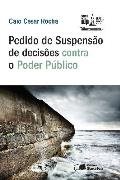
Author: Caio Cesar Rocha
Synopsis: The attempt at procedural reform in the country has been constant. There are numerous justifications for the modernization stages of the Judiciary to continue. To ensure the effectiveness of the process, that is, to guarantee broad access and the effective implementation of judicial decisions, with the obtaining of practical results, in recent years we have followed the emergence of countless procedural laws with the proposal to “speed up justice”.
It turns out that, going against the reform process of the Brazilian Judiciary, we face the so-called “counter-reform” movement, headed precisely by the State, especially through its executive arm.
In this work, the obstacles to the regularity of the procedural process refer to the “request for suspension”, a legal figure originally created by a law from 1936, but which was established by Provisional Measure no. 2,180-35/2001. The highlighted institute consists of a preventive means (which is attributed the nature of a “procedural incident”) used by Public Treasurys (federal, state, municipal and autonomous) to prevent the supposedly “harmful” effects of various judicial measures, such as precautionary, public civil action, habeas data, etc., in cases where, if granted, they would put the economy, health, safety or public order at risk.
The author investigates the constitutionality of the “suspension request” in light of more important procedural principles, considering that the Public Treasury already enjoy privileges in the process, which result in the slowness of Justice. As Minister Gilmar Mendes reveals in the Preface, “Nothing really remained to be elucidated, no conflict or apparent contradiction was forgotten under the carpet, waiting, perhaps, for appropriate jurisprudence”. This is, without a doubt, a launch that fills a true doctrinal gap on a topic that has echoed arduous discussions among legal scholars.
Buy
Author: Liziane Angelotti Meira
Synopsis: The taxation levied on foreign trade in goods in Brazil comprises a complex range of legal norms, with a profile that distinguishes it from other sectors of the constitutional tax system. The current scenario is of extraordinary importance, as it has provided Brazil with close commercial relations with several importing countries in North America, Europe and Asia.
In the context of the BRICS, conducive to the conduct of multilateral agreements and businesses, Brazil needs a rational, agile and effective tax subsystem. Small mistakes or mere hesitation in this process can compromise our image with the ideals of good international management in government acts.
Certain of these particularities, Liziane Angelotti Meira presents us with an in-depth study on the matter, in which she dedicates herself to the analysis of each of the taxes, contributions and fees that affect foreign trade operations in goods.
Based on her experience as an auditor at the Federal Revenue, where she works as Head of the Tax Division on Foreign Trade, the author proposes to analyze the matter in light of the multiplicity of international agreements, treaties and conventions, as well as the jurisprudence of the national and international courts.
It can be inferred from reading this work that the tax regime on “foreign trade” differs from the traditional taxation regime due to its malleability, complexity and the link to rules derived from agreements between nations. Certainly, professionals and law students will be able to rely on a safe source of consultation, capable of offering extensive knowledge of tax matters at theoretical and practical levels.
Buy
Author: Twenty-five years after the Constitution was promulgated, many of its norms still lack regulation through ordinary legislation. Paradoxically, the constitutional action of the injunction, instituted by the constituent with the clear and widely known purpose of avoiding the ineffectiveness of constitutional norms, ended up becoming one of the biggest victims of the Constitution's lack of regulation.
After the promulgation of Laws n. 12,063/2009, which deals with the direct action of unconstitutionality due to omission, and 12,562/2011, which provides for intervening representation, the injunction order remained as the only constitutional action devoid of regulatory law.
In 2009, according to the guidelines of the so-called 2nd Republican Pact, a new proposal for regulating the injunction warrant was presented, which incorporated the rules defined by the jurisprudence of the Federal Supreme Court over more than twenty years, renewing discussions around the regulation of this constitutional action.
With the Bills being processed in the National Congress, society, the Legislature and the Executive are called to debate, alongside the Judiciary, on the role of constitutional jurisdiction and the best rite and decision-making techniques to achieve their objectives.
The regulation of the injunction order can represent an expressive signal regarding the model of constitutional jurisdiction that has been practiced in our country, as well as the standard of judicial protection in cases of unconstitutional omissions.
The work brings together studies, criticism and reflections on the most current and controversial issues surrounding the subject. This is exquisite material, which covers both the regulation of the injunction order and the origins, history, doctrine, jurisprudence and all other aspects involving this peculiar constitutional action in the context of constitutional jurisdiction in Brazil.
Buy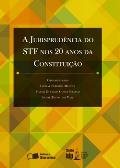
Author: André Rufino do Vale; Gilmar Ferreira Mendes; Paulo Gustavo Gonet Branco
Synopsis: In 2008, the Observatory of Constitutional Jurisdiction, of the Instituto Brasiliense de Direito Público, hosted the project The Jurisprudence of the STF in the 20th anniversary of the Constitution, aimed at producing comments from renowned jurists and students from the IDP postgraduate program on the main decisions of the STF in these two decades.
The result of this important project represents a relevant instrument for understanding Constitutional Jurisdiction in Brazil and its development in the new constitutional order. The set of selected and commented decisions demonstrates that this period of democratic renewal in Brazil was sufficient for the STF to be able to build solid jurisprudence committed to implementing the values of the Democratic Rule of Law.
The comments detail the most important legal aspects of the decisions, in addition to their historical, political and social context, highlighting, in the eyes of the reader, the peculiar relevance of each of them in the context of the development of democracy and the realization of fundamental rights under the Constitution of 1988.
This book is also of fundamental importance in the transnational dissemination of Brazilian constitutional jurisprudence. Thus, at a time when the interest aroused in other countries by the jurisprudence of the Federal Supreme Court is increasing, the comments published here can constitute a special international showcase of Brazilian Constitutional Jurisdiction since 1988.
Buy
Author: Bernardo Pimentel Souza
Synopsis: Two of the most current and interesting themes in the study of Constitutional jurisdiction are covered in this work. The interest in the themes is justified, as their understanding occurred as the post-positive paradigm of Law was consolidated, which enabled the development of legal techniques for modifying the Constitution through “informal processes”, especially through the interpretation of the Courts.
Buy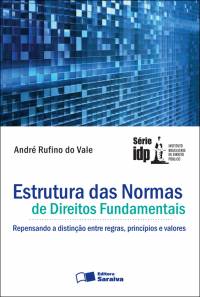
Author: André Rufino do Vale
Synopsis: Given the notorious insufficiency of existing theoretical-analytical approaches - which have often led to findings that, if they say anything on a dogmatic level, fail to fit into the complex reality of the interpretation/application of Law -, the book opens the opportunity to rethinking the distinction between rules, principles and values and their repercussions on the hermeneutics of fundamental rights.
Buy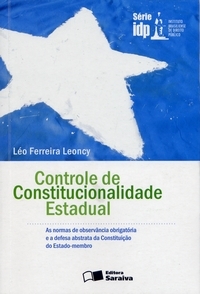
Author: Léo Ferreira Leoncy
Synopsis: After 1988, much was written about the defense of the Constitution of the Republic before the Federal Supreme Court, but little had been discussed about the defense of state Constitutions before the Courts of Justice. In Control of state constitutionality, Léo Ferreira Leoncy takes the fundamental step towards the development of a topic that is still little explored in Brazilian Constitutional Law: the constitutional jurisdiction of the Member States.
Based on the competence provided for in art. 125, § 2, of the Federal Charter, the Author analyzes the main elements of the abstract control of constitutionality before the State Courts and the relevant issues related to the practice of this control, always basing his considerations on contemporary doctrine and the jurisprudence of the Federal Supreme Court.
Presented as a master's thesis at the Faculty of Law of the University of Brasília and approved with distinction by the examining board, composed of José Carlos Moreira Alves (STF) (supervisor), Anna Cândida da Cunha Ferraz (USP), Gilmar Ferreira Mendes (STF) and José Paulo Sepúlveda Belongs (STF), Control of state constitutionality is a book that is of particular interest to Judges and Judges, Prosecutors and Public Prosecutors, State Attorneys and Lawyers from professional associations, unions, political parties, legislative houses and all those who deal with the judicial application of the Constitution of the Member State, in addition, of course, to those interested in learning about this new chapter of Brazilian constitutionality control.
Buy
Author: Gilmar Ferreira Mendes
Synopsis: The 1988 Constitution changed Brazil, whose legal model naturally fell apart during the ill-lit years of military dictatorship. Progressive, the current Charter gave the country the appearance of a Social State by covering, in addition to a true catalog of fundamental rights, numerous provisions focused on reducing socioeconomic inequalities.
Such circumstances put the jurisdiction of the Brazilian Supreme Court under the spotlight, a body that often acts as a driving force behind these advances as it outlines, shapes or supports them doctrinally and legally.
Emeritus constitutionalist, Minister Gilmar Ferreira Mendes has stood out in the task of interpreting and giving full applicability to the Major Law, appearing as an undisputed exponent in the exegesis of constitutionality control.
Hence the importance of systematically gathering and cataloging the most emblematic decisions handed down by who, in the words of the President of the Court, Minister Cezar Peluso, is “one of the most erudite constitutionalists and Brazilian university professors”.
It is, therefore, a comprehensive work, which serves both law scholars and those interested in understanding the trajectory and role of the Federal Supreme Court in the consolidation of the Brazilian Democratic State. The constitutional jurisdiction exercised in the Supreme Court is vital importance for a country and its people, and in Brazil it is no different.
The Federal Supreme Court is located at the apex of the structure of the Judiciary, and the most sensitive issues in Brazilian society converge on it. The Author's intention is to make the judgments resonate throughout the country. This book contributes both to the gathering of the Court's judgments and to the externalization of the legal theses that are analyzed and discussed by the eminent ministers. Gilmar Mendes selected the most relevant decisions he made in the first nine years of operation. To facilitate understanding and consultation, thematic classification was the best alternative. The reader encounters a diversity of subjects, related to fundamental rights, political rights, electoral systems, constitutionality control, public administration and essential functions of justice, with highlights being the decisions with the greatest repercussion on the national scene, such as the Cesare Battisti cases, demarcation of Raposa Serra do Sol indigenous lands, Clean Record Law, scientific research with stem cells, etc.
Buy
Author: Gilmar Ferreira Mendes
Synopsis: The allegation of non-compliance with a fundamental precept emerged as an alternative to the incident of constitutionality, designed in some projects to resolve the repetition of processes and the consequent delay in judgment in cases in which constitutionality was questioned through diffuse means.
Gilmar Ferreira Mendes, in joint studies with Celso Ribeiro Bastos, saw this mechanism as a very special constitutional action, and from there the bill was born to discipline the hypotheses of appropriateness, the legitimacy of the procedure and other aspects widely debated with the collaboration of renowned legal consultants.
According to art. 1 of Law no. 9,882/99, the allegation of non-compliance with a fundamental precept is applicable to avoid or repair the injury to a fundamental precept resulting from an act of the Public Power and also to resolve a relevant constitutional controversy regarding the federal, state or municipal law or normative act, including the previous ones to the Constitution.
In this way, the instrument allows relevant constitutional issues to be resolved, preventing the definitive outcome on them from coming after many years and allowing the Supreme Court's interpretation to prevail. It also makes it possible to question the compatibility of even pre-constitutional law (laws prior to CF/88) and the concentrated control of municipal normative acts. Furthermore, the erga omnes effectiveness and the binding effect lead to the inexorable guideline of the solution adopted by all bodies of the Judiciary.
Buy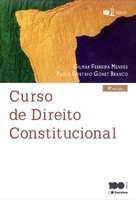
Author: Gilmar Ferreira Mendes; Paulo Gustavo Gonet Branco
Synopsis: This Course is aimed both at those beginning to study Constitutional Law and at those who need more detailed references on the foundations and problems that make up the constitutionalist's agenda.
Numerous questions, with an academic approach and accompanied by jurisprudential solutions, are covered here. The most common doubts are the subject of this book, as well as investigations that require more analytical refinement and density in the approach.
The reader is guided, in the various chapters in which the book unfolds, from basic notions to stimulating and disturbing inquiries. Along this path, both those who make their first contact with Constitutional Law and those who are initiated meet.
This has been the formula for the success of the courses that the authors have shared, for more than a decade, in Brasília, at the IDP — Instituto Brasiliense de Direito Público, for auditoriums in which the still student shares space with the accomplished professional.
The reader will also notice that the professional history of each author, parallel to teaching, influences the objective treatment of the issues raised. Gilmar Mendes is a Minister of the Federal Supreme Court and Paulo Branco is Deputy Attorney General of the Republic.
Third place in the “Best Law Book” category of the 50th edition of the Jabuti Prize, the Course is the result of a partnership between the Institute and Editora Saraiva.
Buy
Author: Jorge Amaury Maia Nunes
Synopsis: Legal Security and Binding Precedent is a book that investigates, within the scope of the General Theory of Law, the binomial launched in the title itself: as the first element, legal security, which constitutes, alongside the idea of justice and social progress, the fundamental reason for Law itself and without which, by definition, it cannot exist.
The second element of the binomial, the binding summary, functions as a kind of indicator of society's expectations in relation to the activity of the Judiciary in the assessment of specific cases.
The summary allows the jurisdiction to increase the degree of certainty about the soundness of their conduct and about the State's response to their claims, when their formulation is necessary.
With this, one can expect, with a reasonable possibility of success, a reduction in the number of demands filed with the competent Power, in addition to a more expeditious and more effective judicial response. The examination of the control of social expectations presupposes an interpretation of the individual legal norm within the legal system - and for this purpose it is admitted, as a working hypothesis, that Law constitutes a system, although the construction of this norm for the specific case may open up some sometimes, space for the topic -, the author is aware of the fact that the creative power of the judge, when pronouncing the sentence, is a reality that cannot be escaped.
Despite this fact, the existence of the binding summary acts to limit the creative power of the judge and prevent it from becoming arbitrary. Far from intending to exhaust the topic, the book investigates similar institutes in Comparative Law, such as stare decisis in common law systems. It also takes a tour through the history of Portuguese Law, which saw the institute of seats, also with inculcating force, in order to try to understand this new institute, its nature and, above all, to what extent it can satisfy the desire for legal security that justifies the existence of the Law.
Buy
Author: Ives Gandra da Silva Martins Filho
Synopsis: The book shows, in a schematic way, a global view of labor law. It addresses the basic institutes of this branch of legal science, providing structured summaries for reviewing the subject and preparing for competitions. It examines the principles of that matter, the employment relationship, outsourcing, remuneration and salary, duration of work, termination of the employment contract, the work process, resources and special processes. It presents, in its final part, a panoramic view of the legal systems of the modern world and carries out a comparative analysis listing the ILO Conventions.
Buy
Author: Paulo Gustavo Gonet Brancoa
Synopsis: The contingency of having to choose, in certain circumstances, between conflicting values, although equally accepted by the Constitution, has become common in constitutional jurisdiction. This task of the highest legal, political and moral significance, which is carried out, among us, by the Federal Supreme Court and by all other bodies comprising the Judiciary, raises intricate questions of an epistemological nature, creating problems of distribution and exercise of power and technical and democratic responsibility.
This book focuses on examining this topic in its multiple aspects. This is an extraction from the doctoral thesis that the author followed as advisor, defended in the first semester of 2008, at the University of Brasília. This publication follows the unanimous recommendation of the examining board (composed of professors Eros Grau, Ingo Sarlet, Menelick de Carvalho Neto, George Galindo and Paulo G. Gonet Branco) for the author to make the work he developed public.
Paulo Gonet recalls the panel's observations on the clear, objective and well-arranged way in which the complex themes were approached, on the successful effort to combine the most relevant doctrine with practical considerations and jurisprudence, highlighting the superior quality of the analytical exposition of Alexy's work on the subject.
This book, with many virtues, will be of value both to the experienced jurist and to those who are serious about studying constitutional law. Everyone will find, here, a map of relevant topics on balancing judgment and a sensible and comprehensive guide for the execution and criticism of this exercise of creating law.
Buy